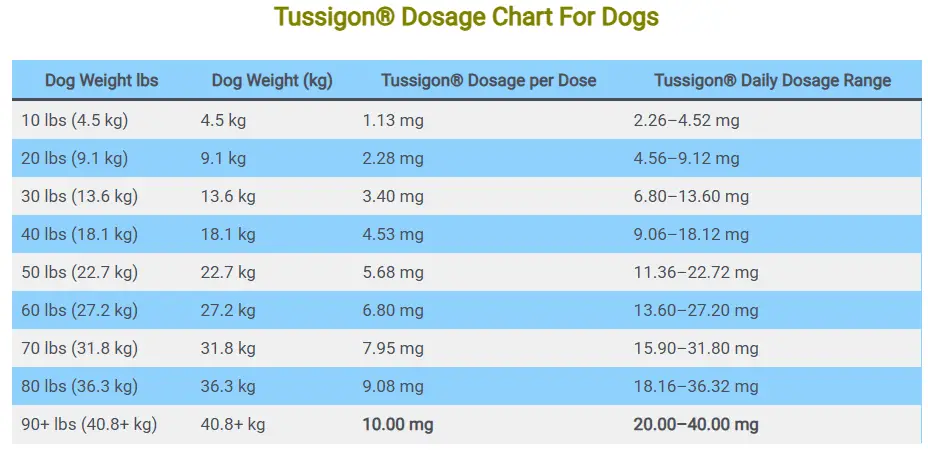Disclaimer: All the information in this guide is for educational purpose only. Before administering any medication to your dog, always consult with your veterinarian. They can recommend safer alternatives specifically formulated for canine use and appropriate for your pet’s specific health profile.
Tussigon for dogs is the brand name for a combination drug that contains hydrocodone bitartrate and homatropine methylbromide. Hydrocodone is an opioid analgesic and antitussive (cough suppressant) that works by reducing activity in the part of the brain responsible for triggering coughing. The addition of homatropine discourages overdose since it can cause unpleasant effects if taken in large quantities.
In veterinary medicine, Tussigon is used primarily to control severe or chronic coughing in dogs, especially when it affects quality of life. Unlike mild cough remedies, Tussigon is a controlled substance in the United States, meaning it requires a veterinary prescription. This is due to its addiction potential in humans and its strong effects.
For canines, the goal of prescribing Tussigon is symptom management rather than a cure. A cough may be caused by conditions like tracheal collapse, chronic bronchitis, or kennel cough, and while Tussigon doesn’t fix the underlying problem, it can give dogs relief from constant coughing and allow them to rest and breathe easier.
Is Tussigon® Safe For Dogs?
Tussigon® (hydrocodone bitartrate) can be safe for dogs, but only when prescribed and closely supervised by a licensed veterinarian. In veterinary medicine, its use is off-label (extra-label), meaning it is not FDA-approved for animals but is legally prescribed by vets under certain guidelines.
Tussigon Dosage For Dogs
The recommended Tussigon® dosage for dogs is 0.25 mg/kg administered orally (PO) every 6–12 hours under strict veterinary supervision. This canine cough suppressant and pain reliever requires precise weight-based dosing – for example, a 20-kg dog would receive 5 mg per dose (0.25 mg/kg × 20 kg). Never exceed 10 mg per dose regardless of weight.
Tussigon® Dosage Chart For Dogs
| Dog Weight lbs | Dog Weight (kg) | Tussigon® Dosage per Dose | Tussigon® Daily Dosage Range |
|---|---|---|---|
| 10 lbs (4.5 kg) | 4.5 kg | 1.13 mg | 2.26–4.52 mg |
| 20 lbs (9.1 kg) | 9.1 kg | 2.28 mg | 4.56–9.12 mg |
| 30 lbs (13.6 kg) | 13.6 kg | 3.40 mg | 6.80–13.60 mg |
| 40 lbs (18.1 kg) | 18.1 kg | 4.53 mg | 9.06–18.12 mg |
| 50 lbs (22.7 kg) | 22.7 kg | 5.68 mg | 11.36–22.72 mg |
| 60 lbs (27.2 kg) | 27.2 kg | 6.80 mg | 13.60–27.20 mg |
| 70 lbs (31.8 kg) | 31.8 kg | 7.95 mg | 15.90–31.80 mg |
| 80 lbs (36.3 kg) | 36.3 kg | 9.08 mg | 18.16–36.32 mg |
| 90+ lbs (40.8+ kg) | 40.8+ kg | 10.00 mg | 20.00–40.00 mg |
Tussigon For Dogs Dosage Guidelines
Determining the right dosage of Tussigon for dogs depends on multiple factors. Unlike human medicine, where standard doses apply to adults and children, veterinary dosing must account for body weight, breed, and underlying health conditions.
Some general principles include:
- Dosage is weight-based: The larger the furry friend, the higher the dosage.
- Age matters: Puppies and seniors metabolize drugs differently.
- Health conditions play a role: Dogs with kidney or liver disease may need smaller doses.
- Veterinary supervision is mandatory: Because hydrocodone is a controlled substance, only a licensed vet can prescribe the exact amount.
Potential Side Effects of Tussigon For Canines
Like any powerful medication, Tussigon comes with risks. While many dogs tolerate it well, some may experience side effects that range from mild to serious.
Common Mild Side Effects
- Drowsiness or sedation – Dogs may sleep more than usual.
- Constipation – Opioids slow down the digestive system.
- Reduced appetite – Some dogs may eat less while on the medication.
- Mild nausea – Occasional vomiting can occur.
Serious Adverse Reactions
In rare cases, Tussigon can cause severe side effects that require immediate vet attention:
- Difficulty breathing or shallow breaths
- Extreme lethargy or unresponsiveness
- Severe vomiting or diarrhea
- Collapse or seizures
If you notice any of these signs, contact your veterinarian or an emergency vet clinic immediately.
When to Call the Vet Immediately
Even if symptoms don’t seem life-threatening, you should call your vet if:
- The cough does not improve after a week of treatment.
- Your dog develops unusual behavior or personality changes.
- You suspect you accidentally gave too much medication.
- Your dog refuses food and water for more than 24 hours.
Dogs Who Should Not Take Tussigon
Veterinarians usually avoid prescribing Tussigon for dogs with:
- Liver or kidney disease – These organs process the medication, and impaired function can cause toxicity.
- Severe respiratory issues – Since hydrocodone slows breathing, dogs with existing breathing problems may worsen.
- Pregnancy or nursing – The drug can pass to puppies through the placenta or milk.
- Head trauma or neurological disorders – Opioids can increase intracranial pressure and worsen neurological conditions.
- Hypersensitivity to opioids – Dogs that react poorly to similar drugs should not be given Tussigon.
Medications That May Interact
Hydrocodone can interact with a variety of drugs, leading to increased side effects or reduced effectiveness. Common examples include:
- Sedatives or tranquilizers (diazepam, acepromazine) – May cause extreme drowsiness or dangerously slow breathing.
- Other opioids (codeine, morphine, tramadol) – Can increase risk of overdose.
- Antidepressants (SSRIs, MAOIs) – May cause serotonin syndrome in rare cases.
- Antihistamines (diphenhydramine/Benadryl) – May enhance sedation.
If your dog is taking any other medication or supplement, always let your vet know before starting Tussigon.
You May Also Like:
FAQs
Can I give Tussigon without a vet’s prescription?
No. Tussigon is a Schedule II controlled substance, meaning it is illegal and unsafe to give without a prescription. Only a veterinarian can determine the right dose for your dog.
How quickly does it work?
Most dogs show improvement within 30–60 minutes of taking Tussigon. The effects typically last 6–12 hours, depending on the dog’s metabolism.
Can puppies take Tussigon?
Generally, puppies are not prescribed Tussigon due to their developing systems and higher sensitivity. Vets usually recommend safer alternatives for younger dogs.
What happens if I miss a dose?
If you miss a dose, give it as soon as you remember. If it’s almost time for the next scheduled dose, skip the missed one—never double up.
Can I give my dog human cough medicine instead?
No. Many human cough medicines contain xylitol, acetaminophen, or other toxic ingredients for dogs. Only use medications that are specifically prescribed by your veterinarian.











![Can Dogs Eat Blood? 7 Side Effects [Expert Opinion]](https://petskor.com/wp-content/uploads/2022/04/Webp.net-resizeimage-12.jpg)
